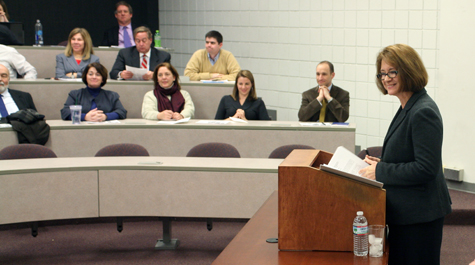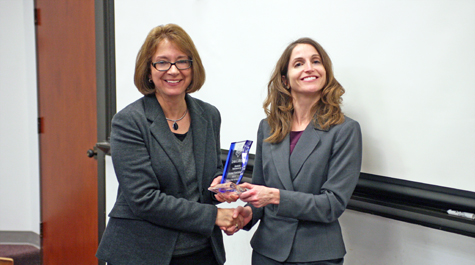Butler Discusses Resilience of Property in Annual St. George Tucker Lecture
On Jan. 23, 2014, Professor Lynda L. Butler of William & Mary Law School delivered the 2013-14 St. George Tucker Lecture to a group of students, faculty, and guests. Entitled “The Resilience of Property,” Butler’s lecture considered possible limitations of the dominant view of property rights in the face of new problems, particularly serious environmental and social issues.
Based on her paper “The Resilience of Property,” published in the Arizona Law Review (55 Ariz. L. Rev. 847 (2013)), Butler’s lecture began by tracing the rise to dominance of what she termed the “mainstream economic view” of property. According to Butler, this theory of property, emphasizes individual rights to property over collective interests in order to promote efficiency and maximize social utility.
Butler argued that this view of property is slowly being intertwined with constitutionally protected property, undermining the long-term resilience of property. “By giving constitutional primacy to individual autonomous interest based on mainstream economics, this coupling is locking in a view that encourages the commodification of natural resources through marketplace incentives and ignores the long-term cumulative cost of property use to ecosystems and society.”
The mainstream economic view is limited, Butler asserted, because it fails to recognize the evolution of a concept of property as a result of a dialectical process through which interests are balanced and adjusted. This limitation results in a lack of “resilience,” or the capacity of the property system to handle disturbances and new challenges. “Serious challenges, like climate change, that jeopardize the continued stability of complex societies,” said Butler, “will need a property system that has interdisciplinary inclusion and coherence, realistic assessment of ground conditions, and a broader view of the functions and goals of property.”
Butler is Chancellor Professor of Law and Director of the Brigham-Kanner Property Rights Project at the Law School. She served as the Vice Dean from 2000 to 2008 and as Interim Dean from 2008 to 2009. Since 2008 she has been a Co-Chair of the College of William & Mary’s Committee on Sustainability, through which she helped develop the College’s sustainability program.
Butler earned a B.S. in mathematics from the College of William & Mary and her J.D. from the University of Virginia. Her academic areas of specialization include property law, eminent domain, environmental law, and natural resources law. She is particularly interested in the interaction of the law and the sciences, specifically with regard to environmental issues.
Established in 1996, the St. George Tucker Lecture Series recognizes annually the scholarly achievements of a senior member of the Law School faculty.
About William & Mary Law School
Thomas Jefferson founded William & Mary Law School in 1779 to train leaders for the new nation. Now in its third century, America's oldest law school continues its historic mission of educating citizen lawyers who are prepared both to lead and to serve.

